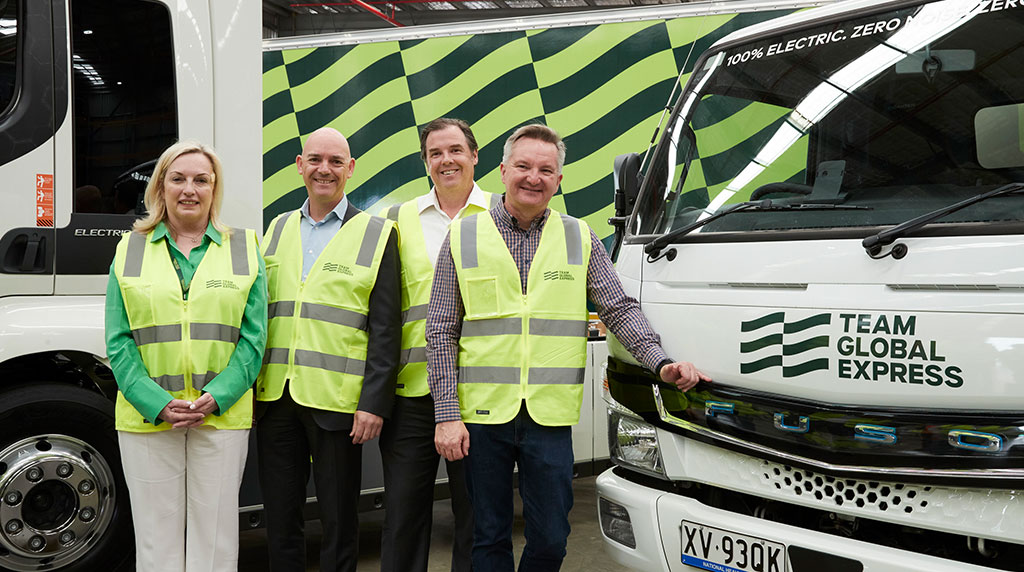The fleet, based at TGE’s western Sydney depot, received funding of $20.1 million from the federal government’s Australian Renewable Energy Agency (ARENA) agency.
The “depot of the future” project will integrate battery electric vehicles in TGE’s transport and logistics operations and specifically within its Express Parcels fleet at the western Sydney depot in Bungarribee, NSW.
The $44.3 million commitment includes the purchase and operation of 24 Daimler Fuso eCanters (Light Rigid Vehicles), 36 Volvo eFLs (Medium Rigid Vehicles) and associated charging and site infrastructure to enable vehicle integration into the depot.
TGE group CEO and former Australia Post boss Christine Holgate said the move would place the company at the forefront of EV adoption in the Australian logistics sector.
“Today’s announcement is a major milestone for our people and our customers. This trial will help to reduce our scope 1 emissions profile, and that of our customers, and give our valued employees at Bungarribee the opportunity to be trained on charging, driving and optimising the electric vehicles of the future,” she said.
“Team Global Express and our shareholders Allegro will be contributing $24.2 million to the ground-breaking project.”
TGE operates across Australia and New Zealand and has more than 13,000 delivery vehicles.
TGE said that the EV project “plays a critical role in Global Express’ decarbonisation strategy” and will see one-third of its western Sydney fleet transition to BEVs and operate under a ‘back-to-base’ model, with the trucks travelling from distribution centres to customers in urban areas, then returning to the depot for charging.
It said that the project “is expected to generate significant insights on the impact on fleet management, delivery routing and infrastructure requirements when a large fleet electrifies a material proportion of its operations.”
The project’s energy partner, ARENA, has committed over $100 million to the transport sector since 2016, including fast charging networks, home smart charging trials and hydrogen refuelling infrastructure.

Team Global Express Group CEO, Christine Holgate, ARENA CEO Darren Miller, Daimler Truck Australia Pacific President and CEO, Daniel Whitehead and Federal Minister for Climate and Energy, Chris Bowen with a Fuso eCanter
ARENA CEO Darren Miller said the project is an important next step to reduce emissions from heavy vehicles.
He said the project “will provide valuable insights into the costs and operational aspects of transitioning its wider fleet to zero emissions vehicles.
“Importantly, our goal is for the heavy vehicle industry to learn from this project as others consider their transition pathway.
“Operating a fleet of battery electric heavy vehicles will help to address some of the key barriers to adoption, including overcoming the higher upfront purchase price, and uncertainty of integrating electric vehicles into existing operations at scale.
“Understanding these barriers will help to build market confidence around EV technology and show that the transition to heavy electric vehicles is possible.”
ARENA says its funded projects have progressively built an understanding of key issues and helped to address key barriers.
ARENA said it will continue to support further development in zero emission vehicles and technologies, including further investment in charging stations across the country, as well as EV charging at home and applications for hydrogen fuel cell vehicles, heavy fleets and vehicles used in mining.
Meanwhile, the news coincides with Tesla delivering its first heavy-duty Semi BEV truck to PepsiCo, five years after announcing it would produce an electric haulage truck.
In 2017, Tesla had said the 300-mile (480km) range version of the Semi would cost $US150,000 ($A223,000), and the 500-mile (800km) version $US180,000 ($A268,000).
Subsequently, Tesla’s passenger EV prices have increased sharply. Tesla did not announce the price of the Semi at this week’s launch.
Tesla chair Robyn Denholm said last month that it might make 100 Semis this year. Tesla boss Elon Musk previously said Tesla would aim to make 50,000 of the trucks in 2024.
PepsiCo, which completed its first cargo run with the Tesla truck to deliver snacks for those attending the Nevada launch event this month, had ordered 100 trucks for 2017.
By Neil Dowling
